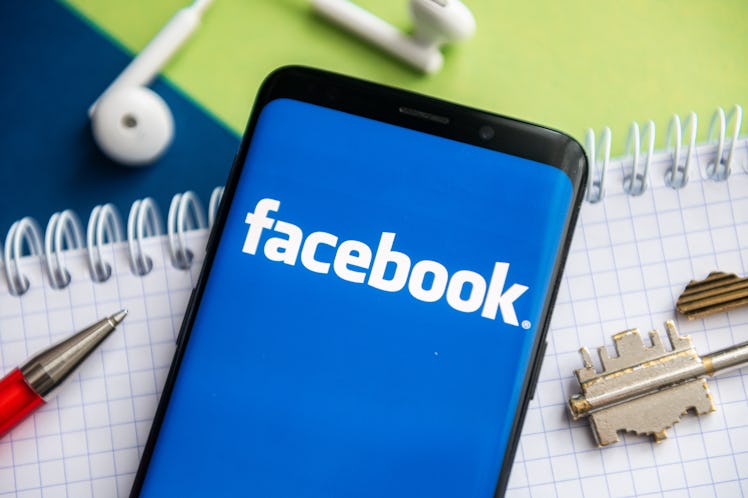
Here's The Reason Behind The Latest Push Calling For People To Delete Facebook
Facebook is in the hot seat for its decision to restrict users in Australia from sharing or viewing news on its platform — a move which comes amidst its refusal to pay journalism sources for news content shared on its platform. If you've seen the hashtag trending on Twitter or heard about the Facebook media blackout, you might be wondering what the "Delete Facebook" movement on Feb. 18 is all about. Here's why users around the world are up in arms about Facebook's decision to halt news sharing in Australia, which may have long-term consequences for Big Tech and traditional media.
Facebook users all around the world saw the Facebook pages of Australian news organizations go blank without warning on Feb. 17. In addition to stopping both Australian individuals and news publishers from seeing or sharing any news articles from local and international outlets on its platform, Facebook users outside of Australia were also halted from accessing Australian news sources on its platform. As of publication on Feb. 18, the news sharing capability in Australia has yet to be restored.
Although Facebook's decision was surprising, the company previously threatened to stop news-sharing capabilities amidst escalating tensions with the Australian government about tech companies paying the country's news publishers for content shared on their platforms. The Treasury Laws Amendment Bill would require a new "mandatory code of conduct" for bargaining between Big Tech and traditional media for news content shared on digital platforms like Facebook or Google, which would result in social media companies paying for content shared on its platforms. It was passed by the Australian House of Representatives on Feb. 17, but it still needs to go through the Senate before it becomes law. Elite Daily reached out to Facebook asking whether the company plans to continue with the ban if the bill were to pass, but did not hear back at the time of publication.
Facebook's decision to halt news sharing on the platform came just hours after Google signed an agreement with News Corp. on Feb. 17 to start paying for the use of its journalism in the UK and in Australia. On Feb. 11, Microsoft President Brad Smith also publicly shared support for the measure and suggested in a blog post that the United States should follow suit by proposing a media bargaining law similar to Australia's.
Campbell Brown, Facebook's vice president of global news partnerships, argued in a Feb. 17 blog post that Facebook's news functions very differently than that of a search engine like Google.
"What the proposed law introduced in Australia fails to recognize is the fundamental nature of the relationship between our platform and publishers," Brown wrote. "Contrary to what some have suggested, Facebook does not steal news content. Publishers choose to share their stories on Facebook. I hope in the future, we can include news for people in Australia once again." Brown also argued that news shared on Facebook accounts for "less than 4% of the content people see in their News Feed," but did not specify how they arrived at that figure.
Facebook's decision to take the hard line quickly prompted backlash. In fact, Stephen Scheeler, the former Facebook CEO for Australia and New Zealand, who left the company in 2017, according to The Wrap, was a loud voice in the call to delete Facebook. The publication reports that Scheeler told The Australian of the ban, "It shouldn’t have happened. But unfortunately it did. But there’s no good answers." He also encouraged users to delete the app to encourage more regulation, saying "...If you wanted a glaring example of why Facebook needs more regulation, this is it." Elite Daily reached out to Facebook for comment on Scheeler's call to delete the app, but did not hear back at the time of publication.
It seems the news blackout was the tipping point for many users, and the hashtags #DeleteFacebook and #BoycottZuckerberg began trending on Twitter late on Feb. 17 and on Feb. 18 as people deleted their accounts in protest.
Elite Daily reached out to Facebook for comment on how many accounts were deleted since the Feb. 17 news restriction, but did not hear back at the time of publication.
As users around the world weighed in on what this could mean for Facebook and news in other countries, the Australian blackout came with some unexpected glitches that appeared to impact essential information sources. According to CNN, the Facebook pages of a number of weather, state health agencies, fire and emergency services, and domestic violence nonprofits were also impacted. Facebook has said it plans to go back and re-review some of the accounts it temporarily shut down. Elite Daily reached out to Facebook for comment on how it plans to adjust its filters to review non-news content, but did not hear back by the time of publication.
As of publication on Feb. 18, it's not clear if or when Facebook will reverse its decision as the Australian media proposal goes through the country's legislature — it's believed the bill has enough votes to pass the Senate, per The New York Times. In the meantime, it wouldn't be surprising if other countries introduce similar media bargaining proposals for tech companies to pay for content.